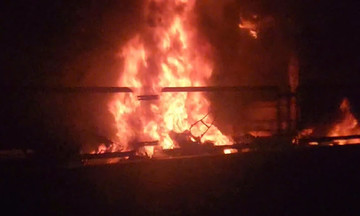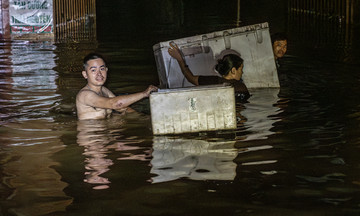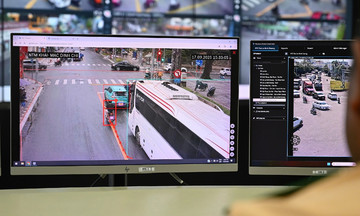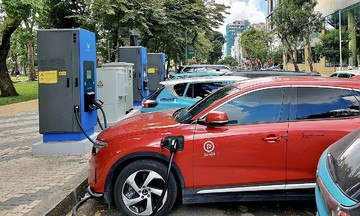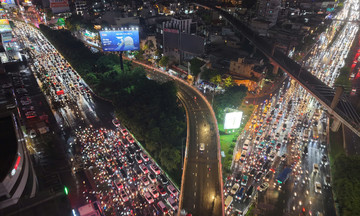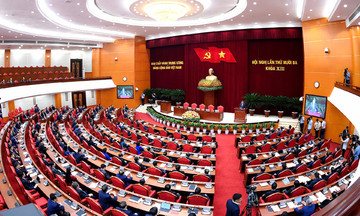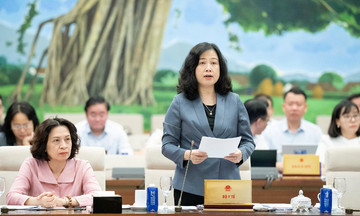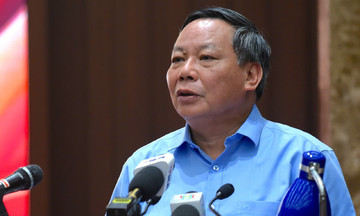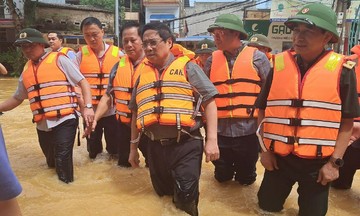In 8/1945, following the successful nationwide general uprising, the Vietnam National Liberation Committee was reorganized into the provisional revolutionary government, led by President Ho Chi Minh, with 15 members. Vo Nguyen Giap was appointed Minister of the Interior.
On 2/9/1945, the provisional revolutionary government was presented to the nation at Ba Dinh Square. After President Ho Chi Minh read the Declaration of Independence, giving birth to the Democratic Republic of Vietnam, Minister of the Interior Vo Nguyen Giap delivered a speech reporting on the domestic situation and the government's policies.
Minister Vo Nguyen Giap's speech was published in five installments in the newspaper Cuu Quoc (the official organ of the Viet Minh Front) in September 1945. He began by emphasizing, "After enduring countless hardships and dangers, during which so many of our brave soldiers sacrificed for the Fatherland, we have finally reached this day."
"At this moment, hundreds of thousands of compatriots present here, as well as 20 million compatriots throughout the country, are all excited and elated under the red flag with a yellow star, and together with the Government, vow to sacrifice everything to protect our country. We declare to the world our right to live and the outcome of our people's struggle, which is an undeniable reality," he emphasized, proclaiming the slogans: "An independent Vietnam has emerged", and "The Democratic Republic of Vietnam is established".
"However, the independent and democratic Republic of Vietnam is still in its early days and remains nascent. Therefore, we must quickly guide it towards maturity and stability, impervious to any oppressive or destabilizing forces," the speech stated, affirming that the provisional government represented the will of the entire nation, not just that of any single political organization.
 |
The provisional revolutionary government of the Democratic Republic of Vietnam on Independence Day, 2/9/1945. Archive photo |
The provisional revolutionary government of the Democratic Republic of Vietnam on Independence Day, 2/9/1945. Archive photo
'Resolutely ensuring the freedom and happiness of the people'
Minister Vo Nguyen Giap announced that the provisional government would soon issue a decree convening the National Assembly based on democratic principles. All National Assembly delegates would be elected by the people through universal suffrage. "The National Assembly will provide us with a Constitution and an official government," he said.
Pending the National Assembly, the provisional government was tasked with immediately implementing urgent measures regarding domestic affairs, foreign policy, military, economy, finance, culture, and relief efforts.
Regarding domestic affairs, the provisional government pursued a policy of unity and solidarity. "The distinction between Central, South, and North will no longer exist. The division among ethnic groups in Indochina will completely disappear," the speech stated. Those who had made mistakes, if they returned to the right path, would be forgiven. The property and lives of foreign nationals "will always be respected." "The only thing worth emphasizing is that the people's government resolutely guarantees the freedom and happiness of the people," he said.
To implement this policy, the government established "close" contact between the central and local levels to enforce a unified policy across the country. Public awareness was raised to ensure people understood how to "preserve" and "exercise" the newly won democratic freedoms.
Regarding military affairs, the liberation forces would be reorganized and expanded into a national army strong enough to defend independence. The training of military officers to command the regular army, along with guerrillas and militias, would be expedited to address the situation.
Government supports the private sector
Regarding the economy, Minister Vo Nguyen Giap frankly pointed out that the exploitation by France and Japan "has endangered our nation's economy." Production capacity was hampered by monopolies; industries were turned into factories for military equipment; and trade was disrupted by hoarding and speculation.
To revive the economy, the government would build a national economy where everyone had the freedom to do business. The government would encourage and support the private sector in business ventures.
The country's financial situation was "very worrying and facing many difficulties." However, the government had devised methods to overcome these challenges. Despite facing numerous difficulties, the government would gradually implement measures that the people desired, such as abolishing the poll tax and market tax, to ease the livelihoods of the poor.
Since the construction and development of the national army required substantial funds, the government would implement special measures such as public works projects, fundraising campaigns, and income tax.
"In these solutions, the Government relies heavily on the patriotism of our compatriots," Mr. Giap expressed, emphasizing that "in this critical moment, everyone recognizes that if the country is lost, their homes will also be destroyed."
Compulsory primary education, free secondary education
Regarding culture, the government affirmed that it would treat writers and journalists who had previously strayed with "leniency." The Censorship Department would temporarily retain certain information to prevent news or propaganda that could harm the evolving diplomatic and domestic situation. "But soon, when the political situation becomes clearer, freedom of speech and freedom of thought will be immediately granted," Mr. Giap declared.
The government was organizing a new education system based on the principle of compulsory primary education and free secondary education, with scholarships provided for poor students. Teaching would focus on cultivating essential life skills and technical abilities. The government would soon issue a decree mandating the learning of the national language (Quoc Ngu) to eradicate illiteracy.
A national academic system would also be established immediately, starting with specialized committees to research various fields of intellectual activity. Backward and anti-progressive customs and practices would be eliminated.
The government was also attentive to relief efforts, as floods had left "millions of victims with nothing to eat," and it needed to provide aid to provinces facing rice shortages due to crop failures. "Of course, the Government must shoulder the responsibility of preventing famine from returning to devastate our compatriots as it did a few months ago," the speech stated.
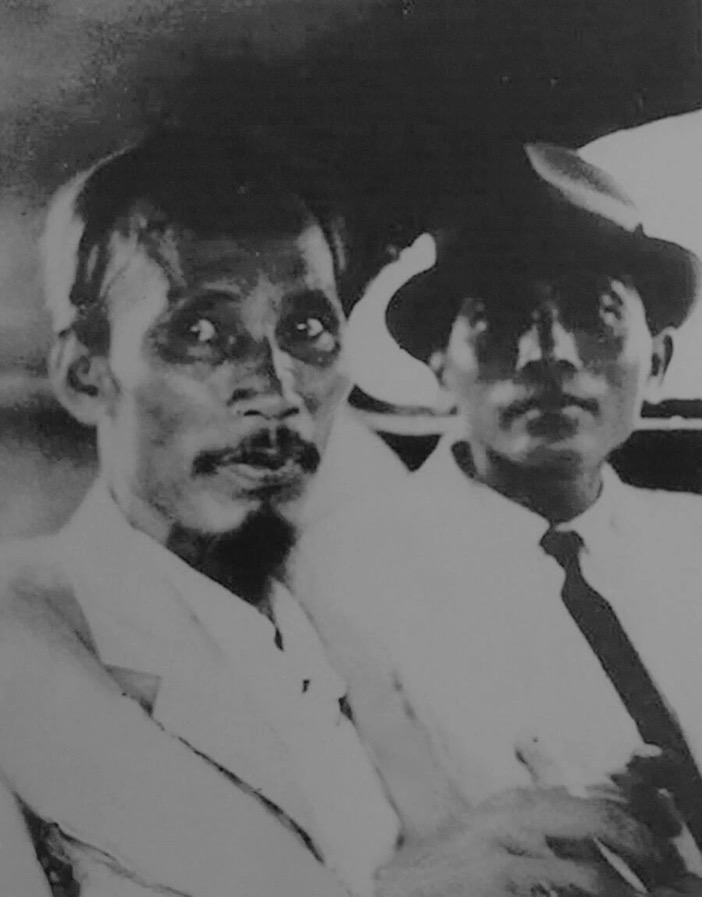 |
President Ho Chi Minh and General Vo Nguyen Giap on 2/9/1945. Photo: Vo An Ninh |
President Ho Chi Minh and General Vo Nguyen Giap on 2/9/1945. Photo: Vo An Ninh
'We must take our own initiative to determine our destiny'
Regarding foreign policy, Minister Vo Nguyen Giap acknowledged the public's attention to the Allied missions that had arrived in Hanoi and that "everyone is concerned about the Government's diplomatic outcomes." However, he urged the nation to view the situation calmly, avoiding excessive optimism or pessimism.
"Our foreign policy is based on two factors: international circumstances and our own strength," Minister Giap stated.
Specifically, towards the US and China, the government affirmed "a special affinity." China was Vietnam's closest neighbor geographically, and shared similarities in lifestyle, economy, and culture. Meanwhile, the US "is a democratic country, with no territorial ambitions," and had played a significant role in defeating fascist Japan - Vietnam's enemy. "Therefore, we consider the US a good friend," he said, pointing out that the most important concern at the time was the French government's attitude towards Vietnam's independence. The government declared, "We swear to live and die with them," if France sent troops back to Indochina.
After outlining the provisional government's policies across key areas, Minister Vo Nguyen Giap acknowledged that Vietnam would face many difficulties in all aspects, especially diplomacy. "We do not rely on anyone. We do not need any luck; we must take our own initiative to determine our destiny," he urged, emphasizing that "at this time, division, doubt, and apathy are all acts of treason."
Concluding his speech, Minister Vo Nguyen Giap called on compatriots to dedicate their resources and lives to rebuilding and adorning the nation, "to restore the brilliance and prosperity of our beloved Vietnam after so many years of suffering and exhaustion."
"Following the tradition of previous generations, our generation will fight a final battle so that future generations can forever live in independence, freedom, and happiness," Minister Vo Nguyen Giap concluded his speech on Independence Day, 2/9/1945.
The Government's aspirations for construction remain valuable
Associate Professor Dr. Bui Hoai Son, a specialist with the National Assembly's Committee for Culture and Social Affairs, described Minister Vo Nguyen Giap's speech as "very special."
"If the Declaration of Independence was a declaration of the Vietnamese people's right to freedom, equality, and independence before the world, then Minister Vo Nguyen Giap's speech was a plan of action, a call to the entire nation to join forces in building the newly born nation. 80 years have passed, and rereading this text, we still see the heroic spirit, the aspiration for construction, and a vision that remains valuable today," Mr. Son said.
Minister Vo Nguyen Giap affirmed that independence could only be truly sustainable when based on a unified government, a National Assembly elected by the people, and a Constitution guaranteeing the rights of all citizens. "That was the institutional vision of a revolutionary who was also a thinker, laying the foundation for the Democratic Republic of Vietnam," he observed.
According to Mr. Son, what elevates the speech beyond a political event to become a timeless value is its focus on culture and education. On Independence Day itself, the provisional government's policies clearly demonstrated that national defense involved not only military strength but also culture and knowledge.
"That value still resonates today as we enter the digital age with the aspiration for practical education that emphasizes both morality and talent," Associate Professor Bui Hoai Son commented, citing the 1945 literacy campaign and the current digital transformation of education as examples of the enduring spirit of ensuring access to knowledge for everyone, leaving no one behind.
The messages from Independence Day also offer insights for today's perspective: to progress on the path of development, the nation must maintain unity, nurture a thirst for learning, preserve its cultural identity, and continuously innovate. "Political independence is only meaningful when coupled with cultural independence, and education is the key to transforming independence into prosperity," Mr. Son shared.
Associate Professor Dr. Tran Duc Cuong, President of the Vietnam Historical Science Association, assessed Minister Vo Nguyen Giap's speech as having immense historical significance in the context of the newly established Democratic Republic of Vietnam in 1945, as well as for the current nation-building process. The speech konkretisiert the strategies and objectives of the country after achieving independence, which President Ho Chi Minh's Declaration of Independence had outlined.
Both the Declaration of Independence and Minister Giap's speech affirmed that Vietnam was completely independent and had emerged in Southeast Asia. "It is crucial that the process of building an independent nation was envisioned and presented transparently and clearly to the people by the most important leaders of the revolution," Mr. Cuong assessed.
The speech highlighted the government's important task of quickly organizing a general election to establish the National Assembly for drafting the Constitution, clearly demonstrating the spirit of a state governed by law and a democratic regime; abolishing the French colonialists' divide-and-rule policy against the Vietnamese people; unifying the three regions; and uniting all people to build a new Vietnam. The government guaranteed freedom and happiness for all citizens living in Vietnam. The government also ensured freedom of business and encouraged the private sector, "which was a very progressive point."
From 1945, the government aimed to provide free education for students, demonstrating its vision and understanding of the important role of education in the country's long-term development. The government's foreign policy at that time, with the spirit of "wanting to be friends with all countries" based on respect for independence, sovereignty, and territorial integrity of each nation, continues to be promoted.
"Many policies outlined in the speech, which were nurtured within the resistance forces in 1945, from economy, education, culture... continue to be firmly upheld today. This demonstrates the unchanging nature of the people's democratic regime over the past 80 years: of the people, by the people, for the people," Mr. Cuong said.
Vu Tuan



